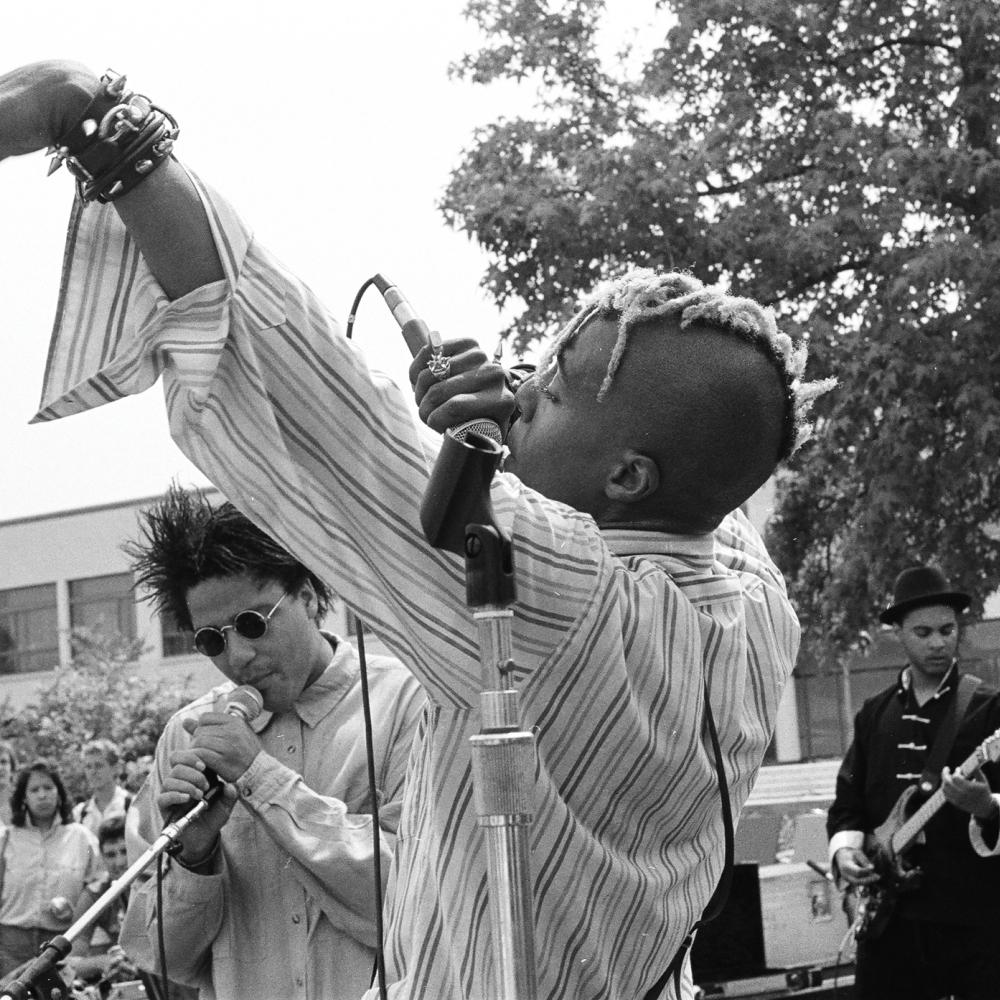Around 1991, Fishbone was poised to ascend the greatest heights of American popular music. Few bands so daring came this close. Fishbone wasn’t punk, funk, reggae, or heavy metal, and yet it was—frenetically, amazingly—all these things at once. According to fans like Gwen Stefani of No Doubt and Perry Farrell of Jane’s Addiction, seeing a live Fishbone concert in its early years was an immersion into a sweaty, tightly wound chaos, with mikes flying, horns blaring, mohawks shaking, and a lead singer doing flips into an eclectic audience coming from all corners of L.A. It was electrifying.
It was also surprising. Fishbone was an all-black band, brazenly kicking its way into the rowdy mosh pit of Caucasian college music. “Fishbone helped desegregate the Southern California music scene,” says Chris Metzler. Metzler, along with codirector Lev Anderson, document the personal stories of the members of this groundbreaking band, as well as the cultural progression of L.A. during the last thirty years, in their new film, Everyday Sunshine: The Story of Fishbone, supported by the California Council for the Humanities.
The saga began back in 1979, when Norwood Fisher (the band’s bassist and founder), his brother, and others, were bussed from South Central to a school in the San Fernando Valley as part of the city’s attempt at desegregation. The only other black student at the school—a smiling, Jehovah Witness-raised oddball named Angelo Moore—sought out their company and begged to join the band, which practiced in what the boys called “the aquarium,” a bedroom at Mama Fish’s apartment in the hood. There, the boys rejected the burgeoning gangster lifestyle surrounding them and created something of their own. Blending the local black funk sound with the white punk music that they were digging in the valley, Fishbone won a battle of the bands and a recording contract with Columbia, while the six musicians—Angelo, the Fisher brothers, Walter Kibby, Kendall Jones, and Christopher Dowd—were still in their teens.
The band became renowned for its relentless stage show and for its defiance of stereotypes. “I’ve seen them do every style—in the same song,” recalls Mike Watt from the early punk band Minutemen. “They are the OG—the original,” says a friend from the old neighborhood who took a different path, rapper Ice-T. “There was no pre-Fishbone.”
Anderson says, “There’s a lot of love for Fishbone in the music industry, because Fishbone’s music and influence is so widespread and respected.” Beginning in the eighties, Fishbone toured with bands such as The Red Hot Chili Peppers (bassist Flea taught Norwood how to surf) and The Beastie Boys, and recorded with artists from Little Richard to Donny Osmond. In 1991, they headlined Saturday Night Live.
But after watching their neighborhood go up in flames on TV following the Rodney King verdict in 1992, the band’s mood changed. “It definitely changed us as people and artists,” says Norwood. “It killed a certain part of your hopefulness and your sense of justice.” They took on more social issues in their songs and started taking themselves more seriously as individual artists. Ego conflicts, substance abuse, and personality clashes inherent to spending years together, day after day on tour and in the studio, began to rip them apart. Kendall broke down and joined a cult, keyboardist and songwriter Chris got fed up with the creative infighting, and trumpeter Dirty Walt left, disgusted with Angelo’s obsession with a sci-fi instrument called the theremin. Finally, only Norwood and Angelo were left to hold the band together, struggling to balance creative integrity and commercial success, or the lack thereof, as they watched their contemporaries reap the royalties they inspired. “The musicians got it, but other people didn’t,” explains saxophonist Branford Marsalis.
Now, thirty years after its inception, without a label, Fishbone ekes out a living on the road, selling T-shirts and CDs on its European tours while Angelo still stage dives at the age of forty-five. Remarkably, since they had their first gig at Madame Wong’s in 1983, there hasn’t been a six-month period when there wasn’t a Fishbone show somewhere. “We’re like a married couple, who want to be divorced for a minute, but we can’t—we got kids. That’s the music,” says Angelo of his love/hate relationship with Norwood.
Despite decades of turmoil in the band, the film ends on an upbeat note. A surprise reunion soothes any lingering bitterness among the original members, and Angelo (the diva) and Norwood (the philosopher) come to a truce in order to start writing music together again. “Fishbone still plays,” says Angelo. “That’s a prayer answered right there.”


